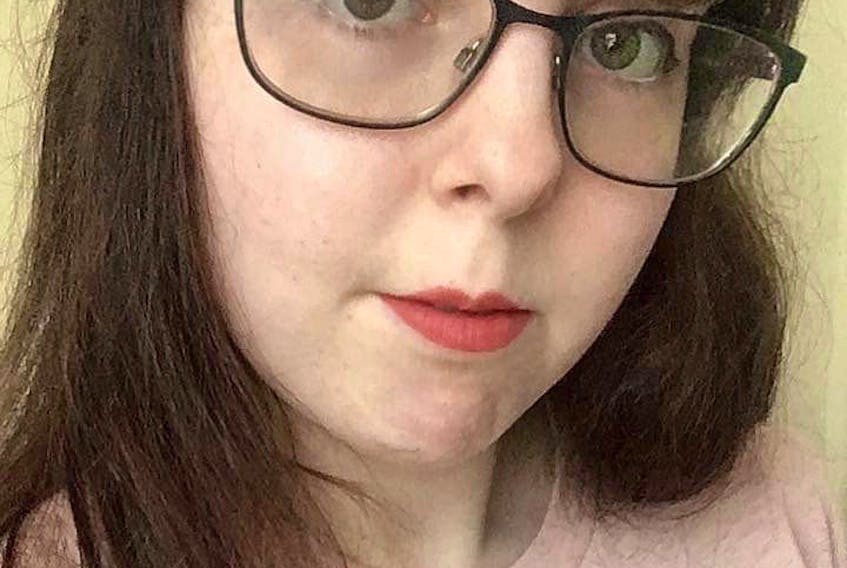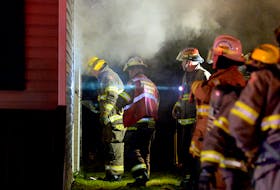PORT HAWKESBURY, N.S. — ANTIGONISH, N.S. - Taylor Linloff wants to be the first person “on the spectrum” to be inducted into the Order of Nova Scotia.
“I am a go-getter,” she said, with a chuckle.
The Port Hawkesbury native, a spoken word poet and autism advocate, is well on the way to reaching that goal.
“We are just like anyone else – we are not robots,” Linloff said, reiterating part of the message she tirelessly works to deliver about people living with Autism Spectrum Disorder (ASD).
The now 25-year-old received what is called a “late-life” diagnosis in 2018.
“She encouraged me to go see my doctor,” Linloff said.
The ‘she’ was her mother, Adele, who offered that advice after watching an episode of David Suzuki's The Nature of Things, one that focused on females with ADHD.
She thought her daughter may have that disorder.
Eventually, Linloff received an ASD diagnosis from a specialist in neuro-developmental issues.
“It was the right tree, but a different branch,” she said of her mother’s estimation.
Linloff said “so much has happened” since her diagnosis.
“My life has improved immensely,” she added.
‘I am not broken’
In hindsight, the diagnosis explains much of what she has dealing with all her life, including anxiety, something that two-in-five people with ASD experience.
“I continue to work on putting myself out there,” Linloff said.
She added, amongst other things, she continues to learn how “to reduce my perfectionist tendencies.”
Linloff now connects her lack of skill, when playing sports in school, to dyspraxia – what she described as “clinical clumsiness” – a condition that affects movement, which is another challenge for some people with ASD.
“I am not broken, not something that needs to be fixed,” Linloff said of the realization she has reached since learning she has the disorder.
She noted there is an issue with adults, especially women, not seeking a diagnosis.
“We need to get the message out,” Linloff said.
Much of her advocacy work for the one-in-59 (roughly 650,000) Canadians with ASD focuses on those who received a late diagnosis, are rural and/or LGBTQ+ and girls and women on the spectrum.
“It is very hard to have a sense of community, especially in rural areas,” Linloff said.
The self-described ‘Aspirational Autistic’ noted some of the myriad challenges faced by adults with ASD, like her, including mental health struggles, economic insecurity, educational barriers and lack of general support.
She added there are often suicide attempts with undiagnosed ASD, with many of them also living with Post-Traumatic Stress Disorder (PTSD).
Linloff suggested ASD and mental health “go hand-in-hand,” pointing out there is stigmatization involved with both.
Noting the need for increased supports, she stressed “there is so much to learn about how our brains work.”
University bound
Along with her advocacy work, Linloff works part time in retail in her hometown, but her steely-eyed focus is on education.
“I want to be one of these people,” she said, noting only 20 to 40 per cent of those with ASD graduate.
Linloff added only one-in-three even move on to post-secondary education.
“That has to change,” she said.
Linloff plans on attending Dalhousie University in Halifax to study commerce as part of her goal of becoming an accounting major.
To help people like her overcome the barriers they face, when it comes to moving on to post-secondary education, Linloff wants to help establish bursaries for mature students with disabilities.
‘Out of my comfort zone’
Linloff will continue to share some of her story this weekend – this time on a national stage.
She is the only Maritimer who will appear in You Can’t Ask That, a CBC docuseries that focuses on Canadian adults living with disability.
“I wanted to get out of my comfort zone,” Linloff said of her decision to audition, part of her continuing focus on “putting myself out there.”
“They captured a live reaction,” she said, explaining participants would not know what they would be asked.
She said her answers to those questions – some stereotypical, while others controversial – were both “heartfelt and tongue-in-cheek.”
Linloff added the goal for the program is to help tackle stereotypes and stigmas associated with people living with disability.
“I learned so much about myself,” she said about her participation in the docuseries.
Linloff added it further inspired her to “educate and inspire” through her advocacy work.
The You Can’t Ask That episode – titled Autism, which has already been shown on Accessible Media and online at CBC Gem – will air on the national network Friday, Jan. 31, at 9:30 p.m.
Linloff can be reached on Twitter (@AspirationAutie), Facebook (/Aspirational Autistic) and Instagram (@AspirationalAutistic).









